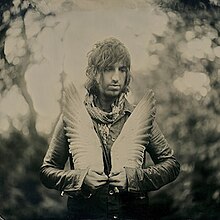The Ballad of Boogie Christ
| The Ballad of Boogie Christ | ||||
|---|---|---|---|---|
 |
||||
| Studio album by Joseph Arthur | ||||
| Released | June 11, 2013 | |||
| Studio |
Catskill, New York Old Soul Studios Brooklyn, New York Rebel Country Silverlake, Los Angeles The Carriage House Los Angeles Gnome Gardens Minneapolis, Minnesota Flower Studio |
|||
| Genre | Folk rock | |||
| Label | Real World, Lonely Astronaut Records | |||
| Producer | Joseph Arthur, Kenny Siegal (3, 4, 8, 9), Chris Seefried (1) | |||
| Joseph Arthur chronology | ||||
|
||||
| Professional ratings | |
|---|---|
| Aggregate scores | |
| Source | Rating |
| Metacritic | 74/100 |
| Review scores | |
| Source | Rating |
| Allmusic | |
| American Songwriter | |
| Blurt | |
| PopMatters | |
The Ballad of Boogie Christ is the tenth studio album by American singer-songwriter Joseph Arthur, released on June 11, 2013 on Real World and Lonely Astronaut Records. A concept album, The Ballad of Boogie Christ follows "a fictionalized character loosely based on [Arthur’s] own journey," and was funded by a PledgeMusic campaign.
The album features a re-recording of the track, "I Miss the Zoo", which appeared on Arthur's previous album, Redemption City (2012).
The Ballad of Boogie Christ's songs originated as poems, with Joseph Arthur noting, "It all came from words and poems like seeds that bloomed into songs which themselves fathered some of the richest music I've made in seventeen years of putting together records." According to Arthur, "Boogie Christ is unlike anything I've ever done before. It’s a big production with horns and soul singers; a psychedelic soul record about redemption and what happens after you find it and lose it."
The Ballad of Boogie Christ is a loose concept album, based on Arthur's life. Regarding the album's narrative, Arthur noted, "I don't know that there's a beginning, middle and end to the story, but there are definitely experiences, situations and perspectives that point in those directions. I wanted to let the listener fill in some of the blanks without telling the whole story in a straight-ahead way." Arthur elaborated, "I've heard David Bowie talk about how Ziggy Stardust and some other records were the beginnings of screenplays that he just never finished. I could really see this becoming something deeper and bigger than just an album. Chuck Prophet reminded me that there's always the Great American Novel, and that really stuck in my head about Boogie Christ. That's what I've been wanting to achieve with this album. He encouraged me that it was okay to dream big."
...
Wikipedia
